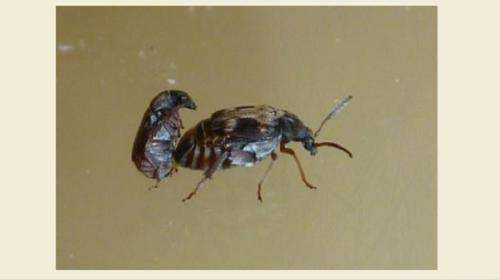Seed beetle 'kicks' sign of antagonistic coadaptation

New research from The University of Western Australia's Centre for Evolutionary Biology has found evolutionary kicking behaviour of female seed beetles (Callosobruchus maculatus) has been 'hi-jacked' by males to promote their own fitness.
Ms Carly Wilson and Professor Joseph Tomkins approached the study with the expectation that female seed beetles' conspicuous kicking during copulation was an evolved behaviour intended to shorten copula duration, which is often damaging to the female due to the rigidity of male spines.
However, the study showed that the practice had no effect on copulation time and may itself cause damage, negatively impacting female fitness.
"The evolution of sexually conflictual male harm is well documented in the seed beetle. Males have spiny aedeagi that damage the females' reproductive tract during copulation, reducing female longevity," Ms Wilson says.
"Female C. maculatus have evolved counter-adaptations to male harm through thickening of the reproductive tract and a conspicuous kicking behaviour during mating that is thought to terminate matings.
"However, in our study, the idea that kicking shortens copula was not upheld.
"Furthermore, we found that males, not females, control the duration of kicking, indeed the duration of all copulation components."
The researchers suggest this could be a result of 'antagonistic coadaptation', in which males and females constantly evolve traits and behaviours that act to increase fitness, each responding to the adaptations of the other.
Does kicking duration benefit females?
The study's first phase looked at the effect of kicking duration on female life history, looking at how long kicking and non-kicking females survived after mating, the number of fertile eggs laid and the number of offspring after 30 days.
They found that female survival decreased according to how long they kicked, with the most pronounced longevity effect found in females who kicked for four minutes.
While kicking did not have any effect on female egg laying or the likelihood of having offspring, females who could kick experienced an eight per cent higher egg-to-adult survival than females who did not kick.
The researchers suggest this could mean that the kicking action promotes the uptake of viability-promoting nutrients or chemical constituents in male ejaculates, providing a long-term evolutionary advantage for the species.
The study also found that male harassment – tested through the introduction of three male rivals 30 seconds after copulation commenced – caused female kicking duration to more than double.
The researchers suggest the optimal female strategy would be to delay kicking until the male's spines are no longer turned outwards—perhaps an evolutionary behaviour to come.
More information: Carly J. Wilson and Joseph L. Tomkins. "Countering counteradaptations: males hijack control of female kicking behavior." Behavioral Ecology first published online March 17, 2014 DOI: 10.1093/beheco/aru022
Journal information: Behavioral Ecology
Provided by Science Network WA

















